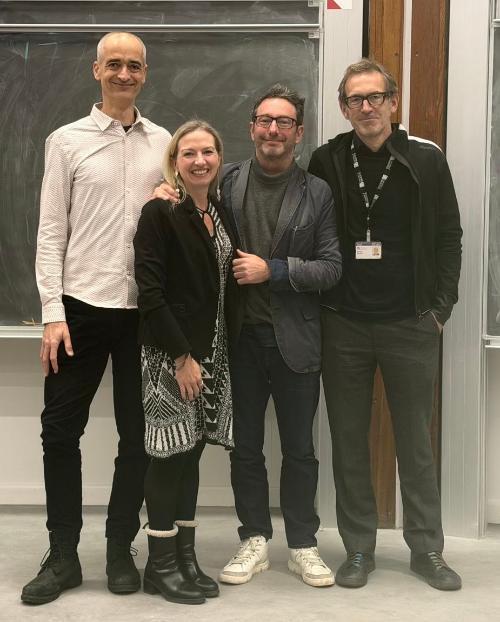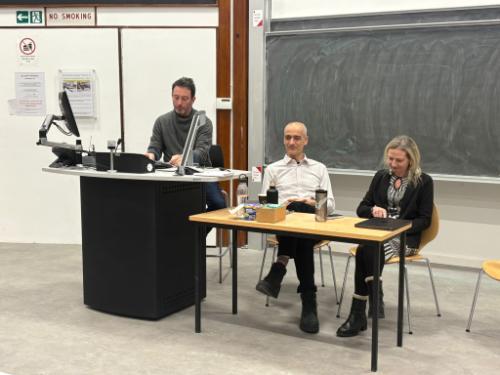Where do we go from here? Conceptualising Peace Research
UoB Professor Roddy Brett is hosting Professor Norbert Koppensteiner and Professor Josefina Echavarría Alvarez from the University of Notre Dame, USA.
Roddy Brett (left) introducing Norbert Koppensteiner (middle) and Josefina Echavarria Alvarez (right) at their talk 'Where do we go from here? Engaging Critically and Creatively with Global Insecurities in a New Peacebuilding Landscape'.
Project Summary:
The way we think and practice peacebuilding remains lodged in 20th century ideas and practices, while the way war is waged has shifted dramatically over the last three decades, as hybrid warfare and polycrises drive forward the nature of war and its consequences, particularly on civilians. Beyond conventional forms of warfare, environmental conflict, the gender impacts of political violence, cyber warfare, the political / criminal violence nexus, drone and technologically contingent warfare, piracy, to name a few, have emerged as forms of violence that states and societies are struggling to address in an effective and sustainable manner. Given that approximately half of peace processes collapse within five to ten years after a peace agreement has been signed, and, when they do not relapse, the quality of peace in post-conflict societies is poor, it is time to ask ourselves whether our theorisation of and practice in peacebuilding need a major overhaul. This question is of particular relevance given emerging authoritarian practices in so-called established democracies, the clear signal at a global level that states are preparing for war rather than investing in peace, and the inability of existing international and national architecture to bring an end to recent wars in Europe and the Middle East.
Within this context, this project addresses the overarching question of Peacebuilding and Conflict Resolution Theory and Practice: where do we go from here?
Towards this purpose this project brings together two teams of researchers at the University of Bristol and the University of Notre Dame who have a sustained and successful record of interdisciplinary collaboration. The team will explore the intersection of the three axes of 1) peace research, 2) peacebuilding practice and 3) histories and legacies of violences, taking in a propositional manner the foundational aspects of peace studies as they relate to teaching and pedagogy. From this point, the team will consider implications for research methodologies and peacebuilding practice, in this manner aiming to contribute to the further theorisation of the field and shape innovations in peacebuilding policy and practice. As such, the policy implications of the project are significant and the team will develop recommendations for policy out of their combined research.
Visitor Biographies:
Professor Nortbert Koppensteiner
Norbert Koppensteiner Director of the International Peace Studies Major (Master of Global Affairs) and Associate Teaching Professor of Peace Studies in the Kroc Institute for International Peace Studies, Keough School of Global Affairs, University of Notre Dame.
Previously, Koppensteiner spent two years as a visiting research fellow at the Kroc Institute where he advanced two lines of research: he explored the art of facilitation for peace and transforming conflicts, with a special focus on embodied approaches, and combined this with methodological and epistemological research into comprehensive ways of knowing.
Before coming to the Kroc Institute, Koppensteiner was the program coordinator at the M.A. program for peace studies at the University of Innsbruck and senior lecturer at the same university. He has taught extensively as a guest lecturer in peace studies across the globe and as a freelance facilitator for embodied practices of conflict transformation with a special emphasis on dance, theater and breath.
Norbert Koppensteiner earned his Ph.D. at the European Graduate School in Saas Fee, (Switzerland) in 2009, an M.A. in peace studies from the University of Innsbruck (Austria), and a Mag.Phil. in political science from the University of Innsbruck (Austria).
He is the author of two monographies, Transrational Peace Research and Elicitive Facilitation (2020) and The Art of the Transpersonal Self (2009), as well as the co-editor of the Palgrave International Handbook of Peace Studies: A Cultural Perspective (2011, 2014).
His current teaching, research and facilitation focus on embodied and integral practices of conflict transformation and qualitative peace research methodologies.
Professor Josefina Echavarría Álvarez
Josefina Echavarría Álvarez is professor of the practice and the director of the Peace Accords Matrix (PAM) program at the Kroc Institute for International Peace Studies, part of the Keough School of Global Affairs. Josefina is also a faculty fellow of the Pulte Institute for Global Development.
As the director of PAM, she leads PAM’s researchers, faculty and staff in the South Bend campus, as well as PAM’s field units that carry out official monitoring of the implementation of peace accords in real time. In Colombia, PAM’s Barometer Initiative carries out official monitoring of the entire 2016 Final Peace Agreement between the Colombian government and the former FARC-EP guerrillas. In the Philippines, in partnership with Catholic Relief Services (CRS) Philippines, PAM-Mindanao provides monitoring methodology and technical assistance to measure the progress of the Normalization Annex of the 2014 agreement between the Government of the Philippines and the Moro Islamic Liberation Front (MILF).
Josefina also directs the Legacy Project for “Preserving and Engaging the Digital Archive of the Colombian Truth Commission", which guarantees continued access to more than 200,000 files including audiovisual, non-textual knowledge and digitized documents compiled by the Colombian Truth Commission. By focusing on developing new teaching materials, harnessing the lessons and best practices for policy impact and supporting innovative academic research and peacebuilding practice, Josefina works towards advancing transitional justice, human rights and the centrality of victims in peace processes.
She is also the co-founder – with Professor Roddy Brett (University of Bristol) of the FuturePeace network.
Josefina earned her Ph.D. in Peace, Conflict, and Democracy from the Jaume I University (Spain), an M.A. in Peace, Development, Security and International Conflict Transformation from the University of Innsbruck (Austria), and a B.A. in Government and International Relations from the University Externado (Colombia).

From left to right: Norbert Koppensteiner, Josefina Echavarria Alvarez, Roddy Brett, Martyn Powell.

